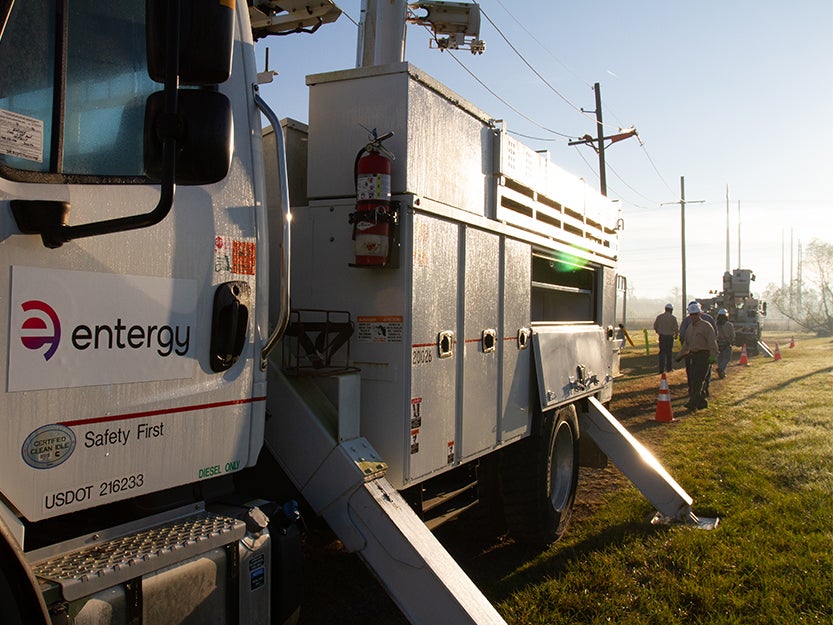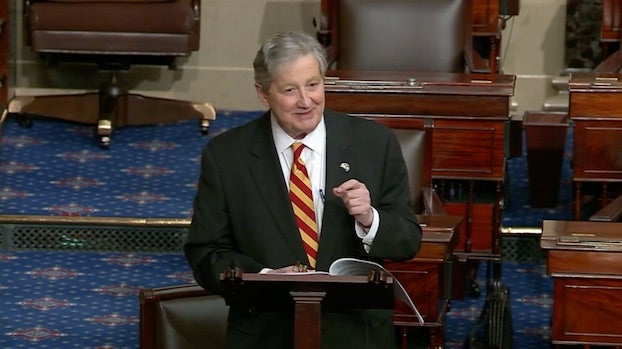Dog a morale booster at Army hospital
Published 9:40 am Sunday, January 27, 2013
FORT?POLK — If Kathy Adams has her way, the staff at Bayne-Jones Army Community Hospital could soon be living a dog’s life.
Adams, who handles resiliency training for the hospital, is looking into acquiring a therapy dog for use at the hospital.
“These dogs have proven to be a morale booster and an aid in reducing stress wherever they are used,” Adams said. “I thought they would be perfect here where they could be used for our staff, patients and wounded warriors.”
To prove her point, Adams invited Joe Tullier and Josh Delancey, canine trainers with Acadiana Canine of Livingston Parish, to bring a therapy dog to Fort Polk to show how the animals interact with people. The two former Marine dog trainers brought a black Labrador retriever named John Wayne on Jan. 15. The dog quickly became a favorite of the folks he met during a tour of the hospital, eliciting oohs and aahs — along with pats to the head and scratches behind his ears.
“This is exactly why I would like to get a therapy dog for the hospital,” Adams said. “Everyone who has met John Wayne has smiled.”
Tullier said he and Delancey do a lot of work with soldiers who suffer from post-traumatic stress disorder. In fact, Tullier himself was medically discharged from the Marine Corps with PTSD and said his therapy dog was a major factor in his recovery.
Delancey said therapy dogs provide those who suffer from PTSD with a “comfort zone” or barrier.
“One of the issues people with PTSD often have is getting stressed out when they are in a crowded area,” Delancey said. “Therapy dogs help by keeping other people from getting too close, and sensing when their owner is getting upset. They also provide the PTSD sufferer with a companion and unconditional love.”
Tullier and Delancey also have a service dog program. Soldiers with severe injuries are matched with dogs that provide assistance such as opening doors and reaching items that are near to the floor. While the typical cost of such dogs runs $9,000-$15,000, Tullier said that through donations he has been able to cut the cost for soldiers to $500-$600, and often no cost.
“We have a soldier on Fort Polk who has been approved for a dog, and we have a dog for him,” Tullier said. “We’re working to make it happen.”
Tullier said pairing soldiers with dogs is not a simple process.
“We have to check the soldier out to make sure he is able to take care of a dog,” Tullier said. “And we have to find a dog that gets along with the owner and is capable of providing what the soldier needs.”
When those requirements mesh, Tullier said it makes his job worthwhile.
“It’s a great reward to watch a dog grow and learn, and see how it can affect a soldier in a positive light.”
Adams said she hopes officials will look favorably on her request for a therapy dog for the hospital.
“It was heartwarming to see the smiles on the faces of our workers and patients when John Wayne made his rounds,” she said. “You could almost see the stress melt away.”
Master Sgt. Shawn Robinson scratches therapy dog John Wayne’s head on Jan. 15 at Bayne-Jones Army Community Hospital. The hospital is looking at the possibility of acquiring a therapy dog for use as a morale booster for both patients and hospital workers. John Wayne





